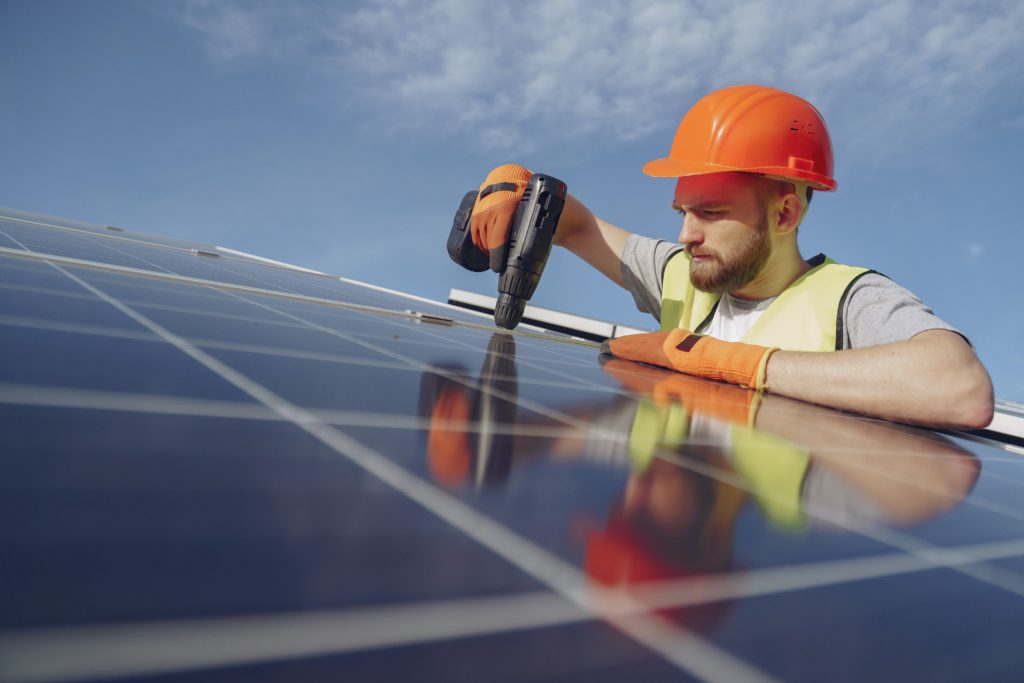The Cost of Installing Solar Panels in Missouri & Arkansas
Anyone interested in adding solar panels to their home knows these systems result in energy savings and can generate a fast return on investment. However, it’s harder to pinpoint exactly how much a solar energy system costs upfront, what installation incentives exist in your area, and how the system will pay for itself over time. This guide will break down all the elements that go into the total cost of a solar energy system so that you can feel more confident in your crucial investment.

Breaking Down the Price of a Solar Panel System
There’s much more to the cost of an energy system than just the solar panels themselves. There are a number of components needed in order for your solar power system to properly function. The total price includes the following expenses:
- Solar panels
- Inverters
- Mounting equipment
- Batteries or backup generators (optional)
- Conduit
- Permit and HOA approvals
- Inspections
- Installation labor
It’s important to note that the biggest variable and most unpredictable element in the total cost of going solar is installation labor. Factors that alter the cost of labor include the make and model of the panels, the style, and angle of your roof, the location of your home, whether you need new attic conduits installed and a variety of other unique circumstances.
A quality solar installation company like Solera Energy will offer a comprehensive consultation that considers all the relevant factors and provides you with the most accurate quote possible before design and installation begin.
Interested in learning more about installing solar panels on your home? Our team of experts is standing by to answer your questions — call today or reach out online!
How Much Do Solar Panels Cost in Missouri?
The average cost for installing solar panels in Missouri is $13,763 for a 5-kilowatt system. The price per watt is an average of $3.50, and the payback period is just over 10 and a half years. In terms of local incentives and solar panel tax credits in Missouri, homeowners should take advantage of these:
- Columbia Water & Light offers up to $625-per-kilowatt generation capacity for systems up to 10 kilowatts.
- Kansas City Power & Light uses net metering to pay up to 25 cents per watt of system power.
- Ameren Missouri and Liberty Utilities offer homeowners who install solar panel systems upfront rebates of 25 cents per watt. For an 8-kilowatt system, that’s $2,000 in savings.
- Missouri homeowners receive an exemption from property tax increases resulting from a solar installation.
How Much Do Solar Panels Cost in Arkansas?
The average cost for installing a solar energy system in Arkansas is $13,825 for a 5-kilowatt system. This brings the cost per watt to an average of $2.76, with a payback period of just under 11 years. The most comprehensive incentive available to Arkansas solar owners is net metering, which follows these guidelines:
- All residential solar energy systems under 25 kilowatts are eligible for net metering, and homeowners can carry over credits indefinitely.
How Much Do Solar Panels Cost in Illinois?
The cost of installing a solar energy system in Illinois is currently averaging $15,649 for a 5-kilowatt system. This brings the cost per watt price to an average of $3.13, with a payback period of just under five years. The best incentive available to Illinois solar panel owners is net metering. This involves:
- Using solar power at your home at night or during cloudy days
- Ensuring that all the solar power that’s generated by your system is used by you
- Providing credits to every solar household based on the power they generate
How Much Do Solar Panels Cost in Kansas?
The cost to add a solar energy system to your Kansas home is averaging $14,457 for a 5-kilowatt system. This means the average cost per kilowatt hour is $2.89, with a payback period of just about nine and a half years. The best incentive right now in Kansas is net metering. Some details include:
- The local power companies can track power generation by the month
- They pay homeowners for the excess, unused power based on the system’s average cost
- The current rate is about 2.1 cents per kWh.
The Federal Tax Incentives for Solar Energy Systems
In addition to any local incentives, homeowners should always take advantage of the federal Investment Tax Credit. The federal residential solar energy credit allows homeowners to credit 26% of the cost of systems installed between 2020 and 2021 and 30% for systems installed between 2022 and 2032.
Eligibility is restricted to homeowners who own their solar panel system outright, whether purchased with all cash or financed. Those who are leasing are not eligible, and the credit can only be claimed for the initial installation of the system. The tax credit applies to the following expenses related to the energy system:
- Solar photovoltaic panels
- Contractor labor costs, including permits, inspections, assembly, and installation.
- Wiring, mounting equipment, inverters, and other balance-of-system equipment.
- Energy storage devices are charged by the newly installed solar energy system panels.
- Sales tax on related expenses.
Thanks to federal tax incentives, installing solar panels on your home can save you money on your electric bills and pay for itself in just a few years.
Manufacturer Rebates & Promotions
As the shift toward solar energy continues, manufacturers that want to remain competitive may offer rebates or promotions from time to time to encourage homeowners to make the switch. These rebates and promotions can be harder to track down than the federal tax credit and local incentives, so be sure to shop around and see what offers are available.
Solera Energy works hard to stay current on all manufacturer incentives so we can design the most cost-effective and powerful system available within your budget. Call us or reach out online now!
Saving Money on Utility Bills
Every homeowner who installs solar panels will reap the benefits of monthly utility bill savings. The amount you can save is dictated by a few factors, like the energy production capacity of the system and how large your house is — but either way, you will see a decrease in utility bills. Additionally, you won’t be subject to the climbing costs of energy that fluctuate wildly depending on demand.
Saving Money With Net Metering
Net metering is an excellent way to save money if your area offers it. If you invest in a solar energy system that can produce more energy than your home requires, you can install a net meter programmed to send that excess energy back to the electrical grid, causing your electric meter to run in reverse.
In exchange for the excess energy, your utility will provide credits on your electricity bill that can be applied when the system does not produce the energy required to run your home — such as long rainy or cloudy periods or winter when days are shortest. Net metering can effectively eliminate electric bills year-round, minus any fees or surcharges applied by your utility company.
Maximize Solar Savings Potential With Solera Energy

Solera Energy is a top choice among Arkansas and Missouri homeowners for one simple reason: We do everything we can to ensure our customers get a tangible return on investment for residential solar systems by offering top-tier options at the best prices possible. We’ll find every incentive and rebate available to help you go solar without breaking the bank. We even provide flexible finance options and a premium referral program to make the switch that much easier.
Solera Energy is prepared to lend our skills and expertise if you’re ready to save with solar power. Call us or contact us online today to get started.

